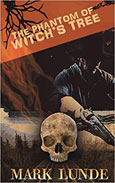
 |
Manifest Destiny has long come and gone in Montana's Rocky Mountain wilderness. However, the Wild West's final glimmer still flickers in October 1912 despite railroads, motorcars, electric lights, and other modern conveniences. Deputy Matt Hargreaves, spoiled scion of an illustrious Civil War hero, meets his tarnished destiny while serving a warrant at a remote farmhouse near the Canadian border. The legal routine goes wrong and becomes paranormal in a decidedly deadly way when an unintended shootout claims the life of a little girl and her father… and Matt's colleague suggests the site should have an accidental fire.
Hargreaves' haunted life will soon intersect with Jody Simms, a psychopathic outlaw with a lust for wrongdoing and capable young ladies like the lovely Rachel Adler, an impressionable waif determined to shed her sheltered, high-society upbringing in Montreal. But before Simms lays his boyish but demonic eyes on Rachel the following spring, a foreshadowing of her future in the backwater village of Widow's Tree arrives in the form of troubling dreams on her train journey across mountains and plains.
If Stephen King, Ray Bradbury, the Coen brothers, Barry Sonnenfeld, and Quentin Tarantino pitched in some ingredients for a dramatic stew, Lunde's humorous paranormal Western—complete with a steampunk-like, magical-realist twist—might be the result. Peppered with out-of-shape anti-heroes and fit but psychologically tortured female leads, this debut novel begins with a bang and chugs along like a coal-fired engine to an anti-climactic conclusion. All the usual Western conventions are present: hard-drinking, hard-riding gunslingers and lawmen, enterprising entrepreneurs and hard-luck losers, snooty society matrons and good-hearted soiled doves, wild and assimilated Indians, and the perennial African Americans and Latino Americans jockeying for their niche in the openly racist Jim Crow milieu. But all conventions have a quirky twist in Widow's Tree, the town that deliberately transcends time to draw tourists while the twentieth century unfolds. Widow's Tree morphs into a sort of Buffalo Bill's Western Show in real life as newspapers report Jody Simms' exploits as "The Phantom of Witch's Tree."
The characters are rich with foibles and contradictions, each embodying a spectrum of noble and ignoble characteristics. Many have an introspective nature that allows readers to probe their psyches more deeply than usual. The prose is fluent with none of the academic pretentiousness of a literary masterpiece but with more panache than usual in genre work. Lunde's storytelling craft and his introspective characters are the pillars of the tale, both surpassing a critical mark that will satisfy both literary and genre audiences.
Lunde, a Canadian, turns the usual borderlands convention on its head, brilliantly setting the tale on the Canadian rather than the Mexican border. One subplot features a commanding but ethereal antagonist who dogs Matt Hargreaves' thoughts: Justin Augustus, a seven-foot-tall Canadian Mountie who investigates the burning of the farmhouse on the border soon after Matt's opening mission backfires. Some readers may find the graphic violence, off-color humor, and frequent references to male genitalia either offensive or tiresome. But these characteristics have some valid provenance in the story arc, the character development, and the gritty reality of the historical era. This humorous and deeply human tragicomedy is lengthy but well worth the effort to peruse. In fact, it may be a tale for the ages.
RECOMMENDED by the US Review